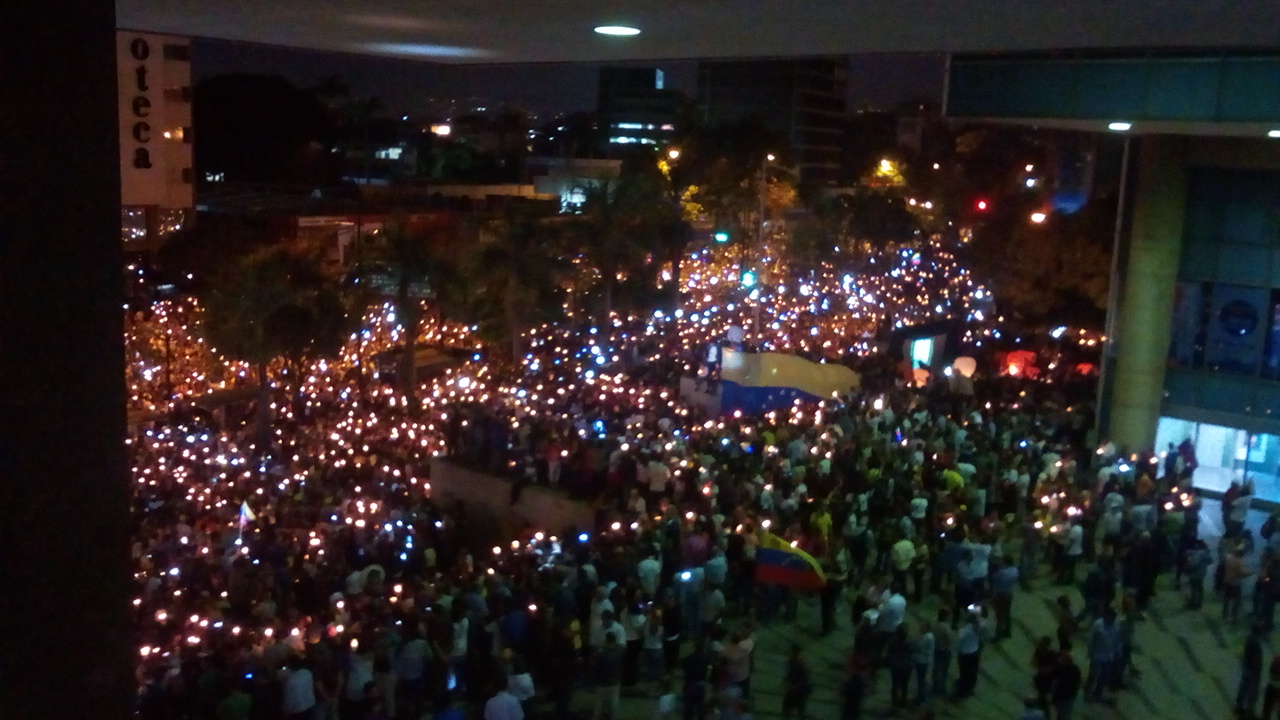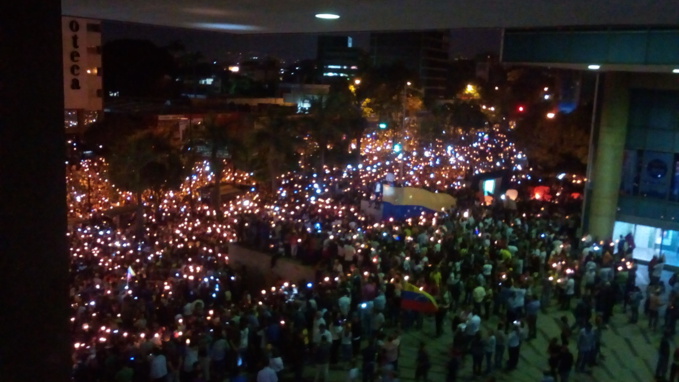Initially, information that one of the units of the National Guard refused to obey Nicolas Maduro appeared on social networks. It followed from a statement of one of the fighters that the guards stationed in the poor metropolitan area of San José de Cotis called to protect the constitution and disobey the current government.
Thus, the fighters of the national party reacted to protests of the population, which are marching in the city. According to the El Nacional newspaper, local residents supported the rebellious security forces - in particular, began to build barricades to prevent special forces policemen, military personnel and agents of the Bolivarian Intelligence Service (Sebin) from rushing to the conflict area. Riots began. The military used tear gas. Residents of the region, among other things, answered them with the traditional method of manifestation of dissatisfaction in Latin America - they went to the balconies and started knocking on the pans, making the loudest sounds.
Soon, the press service of the Venezuelan army said that on Monday morning that "a small group of National Guard officers seized weapons and took four of their colleagues hostage under threat of reprisal." It is reported that the rebels were arrested, and the country's military facilities are currently operating normally. “Again, our national Bolivarian armed forces, the watchmakers, arrest a small group of raiders and traitors of the motherland, who stole weapons to create violence and alarm the population. We will win,” Diosdado Cabello, head of the national constituent assembly of Venezuela (created by Chavistas of the alternative parliament), wrote on his Twitter page. A little later, he added that the security forces acted "with full respect for human rights, the rebels were interrogated, and they had already given their first testimony - allegedly confessed that they had been promised "villas and castles" for such actions.
This is not the first time that representatives of the security forces of Venezuela oppose Nicolas Maduro. The loudest episode occurred in the summer of 2017. Then, one of participants of the underground group “Flannel Soldiers”, a little-known until that moment, a former officer Oscar Perez, hijacked a helicopter and opened fire on the buildings of the Supreme Court and the Ministry of Internal Affairs of Venezuela. He explained his actions by the desire to "return power to the people and restore constitutional order." In January 2018, Oscar Perez was shot dead during a special operation.
The latest incident occurred against the background of another exacerbation of the situation in Venezuela, provoked by the re-entry of Nicolas Maduro in the presidency on January 10th. Many countries — in particular, members of the “Lima Group” (14 countries in the Western Hemisphere) and the United States — refused to recognize the re-election as legitimate. Venezuelan opposition also began active operations. Last week, members of the parliament controlled by the National Assembly declared Nicholas Maduro a usurper, recognizing all his actions invalidated, and also called on 46 countries to freeze the government access to accounts in foreign banks.
In addition, Head of the National Assembly, Juan Guaidó, declared his readiness to assume the duties of the country's president. He is sure that this option is made possible by art. 233, 333 and 350 of the Constitution, which states that if it is impossible for the President to fulfill his duties, the power in the country passes to Head of the National Assembly.
source: el-nacional.com
Thus, the fighters of the national party reacted to protests of the population, which are marching in the city. According to the El Nacional newspaper, local residents supported the rebellious security forces - in particular, began to build barricades to prevent special forces policemen, military personnel and agents of the Bolivarian Intelligence Service (Sebin) from rushing to the conflict area. Riots began. The military used tear gas. Residents of the region, among other things, answered them with the traditional method of manifestation of dissatisfaction in Latin America - they went to the balconies and started knocking on the pans, making the loudest sounds.
Soon, the press service of the Venezuelan army said that on Monday morning that "a small group of National Guard officers seized weapons and took four of their colleagues hostage under threat of reprisal." It is reported that the rebels were arrested, and the country's military facilities are currently operating normally. “Again, our national Bolivarian armed forces, the watchmakers, arrest a small group of raiders and traitors of the motherland, who stole weapons to create violence and alarm the population. We will win,” Diosdado Cabello, head of the national constituent assembly of Venezuela (created by Chavistas of the alternative parliament), wrote on his Twitter page. A little later, he added that the security forces acted "with full respect for human rights, the rebels were interrogated, and they had already given their first testimony - allegedly confessed that they had been promised "villas and castles" for such actions.
This is not the first time that representatives of the security forces of Venezuela oppose Nicolas Maduro. The loudest episode occurred in the summer of 2017. Then, one of participants of the underground group “Flannel Soldiers”, a little-known until that moment, a former officer Oscar Perez, hijacked a helicopter and opened fire on the buildings of the Supreme Court and the Ministry of Internal Affairs of Venezuela. He explained his actions by the desire to "return power to the people and restore constitutional order." In January 2018, Oscar Perez was shot dead during a special operation.
The latest incident occurred against the background of another exacerbation of the situation in Venezuela, provoked by the re-entry of Nicolas Maduro in the presidency on January 10th. Many countries — in particular, members of the “Lima Group” (14 countries in the Western Hemisphere) and the United States — refused to recognize the re-election as legitimate. Venezuelan opposition also began active operations. Last week, members of the parliament controlled by the National Assembly declared Nicholas Maduro a usurper, recognizing all his actions invalidated, and also called on 46 countries to freeze the government access to accounts in foreign banks.
In addition, Head of the National Assembly, Juan Guaidó, declared his readiness to assume the duties of the country's president. He is sure that this option is made possible by art. 233, 333 and 350 of the Constitution, which states that if it is impossible for the President to fulfill his duties, the power in the country passes to Head of the National Assembly.
source: el-nacional.com



















